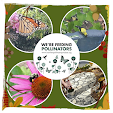 |
| Cicada exoskeleton left behind on Stella Peach Hemerocallis |
It's summer, and we've been listening to the mesmerizing buzz of the somewhat elusive Cicada. It's a nostalgic sound I remember all the way back to my early childhood: A noise always expected during the very hottest days of summer.
Ironically, sightings of actual cicadas didn't always produce a warm and fuzzy feeling, for me at least. I thought them more than a little creepy, having once found a cicada exoskeleton - almost as big as my child-sized hand - clinging to the Willow tree trunk in our yard.
Lately, though, hubby and I have become mesmerized by not just the mystic sound of the cicada; but, also the life cycle and habits of the ancient Cicadidae.
For instance, we've learned that local cicadas typically make their homes in trees. They are sustained by tree sap and lay their eggs in cracks in the tree bark: Our Little Leaf Linden tree with its deep cracks and crevices must be a great draw, explaining the frequency of sightings in our garden.
The larva that fall to the ground and burrow below the soil at the base of the tree, eventually emerge and leave their exoskeleton behind in various locations. Cicadas that live in our neck of the woods are generally considered an annual species; and, their distinctive humming sound is actually the male cicada's mating call, a sound loud enough to actually cause permanent hearing loss if produced close to a human ear.
I recently rescued a couple of cicada, found early in the morning, lying on their backs with legs flailing. Hubby and I introduced our young grand-daughter to these interesting insects and she was excited to see and learn about both versions of cicada: Winged insect and empty exoskeleton.
It's comforting to know that she won't have the uneasy relationship with cicadas that I had growing up: She even named one, "Cicadie".
 |
| Cicadie, as named by my grand-daughter |
